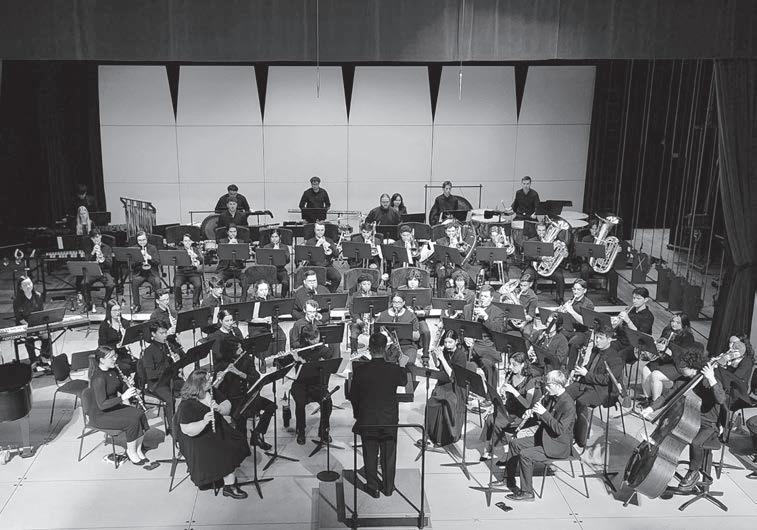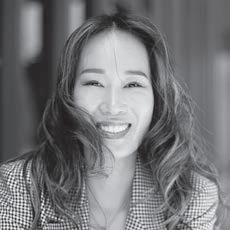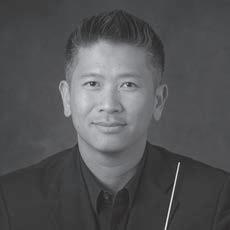




Vu Nguyen, conductor
Shuying Li, composer-in-residence
Friday, September 26, 2025
7:30 pm
Faye Spanos Concert Hall



The Last Hivermind (2018/2021)
In This Breath (2025) (Consortium Premiere)
Music for Prague 1968 (1969)
Introduction and Fanfare
Aria
Interlude
Toccata and Chorale
John and Jim (2024)
(1921-2016)
Shuying Li's residency at Pacific is made possible in part by the Robert and Helen Gross Band Program Endowment.
The Last Hive Mind was originally written for conductor Glen Adsit and the Foot in the Door Ensemble at the Hartt School. Inspired by the British TV series, Black Mirror, and the general idea of recent increasing debate around artificial intelligence and how it will affect our daily lives as human beings. I put some of my thoughts, perspectives, and imagination into this work. Thanks to Glen for coming up with the dynamic and matching title— it also helped in the shaping of how musical narrative navigates its way throughout. Mainly, I was struck by the idea in one episode of Black Mirror, the "Metalhead."
After the unexplained collapse of human society, a group of people tried to flee from the robotic "dogs," a vast hive mind with metal-built bodies and powerful computerized "brains." The failure was almost predictable. However, a detail that struck me the most was the reason that these human beings got trapped in the crazy chase was because of their effort of searching a comforting gift for a very sick child—a fluffy teddy bear. In The Last Hive Mind, two forces fight with each other—the robotic, rhythmic, seemingly unbreakable "hive mind" music, versus the dreamy, melodic, and warm "lullaby" tune. Lastly, presented by the piano, the "lullaby" music is also a quote from my mini piano concerto, Canton Snowstorm. As the title indicates, this work depicts the struggle between the artificial intelligence, or the hive mind, and the dimming humanity; furthermore, the work implies the final collapse and breakdown of the last hive mind followed by its triumph.
—Shuying Li
“My nature is the nature of the cloud—the nature of no birth and no death. Just as it is impossible for a cloud to die, it’s impossible for me to die. I enjoy contemplating my continuation body, just as the cloud enjoys watching the rain fall and become the river far below. If you look closely at yourself, you will see how you too are continuing me in some way. If you breathe in and out, and you find peace, happiness, and fulfillment, you know I am always with you, whether my physical body is still alive or not. I am continued in my many friends, students, and monastic disciples.” —Thich Nhat Hanh, The Art of Living.
This quotation comes from Thich Nhat Hanh’s The Art of Living. This book is a collection of the Vietnamese monk's ruminations on life and death that guided my partner Glen Adsit through his personal struggles when confronted with his own mortality. As well as being my beloved life partner and musical collaborator, Glen was a beloved figure in the music community who touched the lives of countless collaborators and students. In the wake of Glen’s sudden passing in January 2024 we have all become the rain to Glen’s cloud. His inextinguishable spirit and profound influence continue to resonate deeply within all of us. Although his physical body is no longer with us, we now constitute his continuation body and are charged with continuing his legacy of support and love for one another.
This piece is a tribute to Glen, the physical life we shared together, and the new life we share as I continue his legacy in my own way. It reflects the profound love and connection we share, both personally and through our collaborative musical endeavors. The piece is lyrical and tender, inviting listeners into the intimate emotional spaces Glen and I navigated together. It captures the essence of Glen's loving spirit—missed by many, cherished by those who experienced his warmth and guidance, and still apparent in the life and work of his family, colleagues, and students. It is both a celebration of Glen's life and the enduring bond he and I share and a tribute to the legacy of love and artistic collaboration that he left behind for all of us to continue together.
Glen Adsit was a conductor and trombonist. He served as the Director of Bands at The Hartt School and the President of the College Band Directors National Association.
—Shuying Li
On 20 August 1968, approximately 200,000 troops and 5,000 tanks from Soviet and Warsaw Pact forces invaded Czechoslovakia in the middle of the night to suppress the liberal reforms of the “Prague Spring.” These reforms had included loosening restrictions on censorship, free speech, and travel. More than one hundred Czechs were killed and hundreds more wounded. While many nations condemned the attack, no major international action was taken.
Czech-born composer Karel Husa, who left Prague after World War II and later taught at Cornell University from 1954–1992, watched in anguish from the United States as his homeland was occupied. A United States citizen by 1959 and the 1969 Pulitzer Prize winner for his String Quartet No. 3, Husa
responded with Music for Prague 1968, commissioned by the Ithaca College Concert Band and premiered in Washington, D.C., in January 1969.
—Vu Nguyen
The following program note for Music for Prague 1968 is to be printed in all concert programs at the request of the composer:
Three main ideas bind the composition together. The first and most important is an old Hussite war song from the 15th century, “Ye Warriors of God and His Law,” a symbol of resistance and hope for hundreds of years, whenever fate lay heavy on the Czech nation (it has also been utilized by many Czech composers, including Smetana in My Country). The beginning of this religious song is announced very softly in the first movement by the timpani and concludes in a strong unison (Chorale). The song is never heard in its entirety.
The second idea is the sound of bells throughout; Prague, named also the City of Hundreds of Towers, has used its magnificently sounding church bells as calls of distress as well as of victory.
The last idea is a motif of three chords first appearing very softly under the piccolo solo at the beginning of the piece, in flutes, clarinets, and horns. Later it reappears at extremely strong dynamic levels, for example, in the middle of the Aria.
Different techniques of composing as well as orchestrating have been used in Music for Prague 1968 and some new sounds explored, such as the percussion section in the Interlude and the ending of the work, etc. Much symbolism also appears: in addition to the distress calls in the first movement (Fanfare), the unbroken hope of the Hussite song, sound of bells, or the tragedy (Aria), there is also the bird call at the beginning (piccolo solo), symbol of the liberty which the city of Prague has seen only for moments during its thousand years of existence.
Cuong: John and Jim
I first heard the name Obergefell in 2015 when the case that bears it, Obergefell v. Hodges, was decided by the Supreme Court. Among the most important in history for queer Americans, this landmark ruling granted marriage rights to all same sex couples. At that moment, Obergefell was etched in history. For those writing about the law, the name would thereafter be written in italics, and today it’s as much a shorthand for the case law of marriage equality as it is the name of a man. But, at its core, the case begins with two people.
John Arthur and Jim Obergefell were married in July of 2013. They had been together in a loving relationship for 22 years, and Jim was caring for John as he faced the end stages of ALS. In the last year of John’s life, they traveled on a medical plane to Maryland—one of just a handful of states where same-sex marriage was legal at the time—to be married. The marriage ceremony was conducted on board the plane before they returned home to Ohio for their last months together. John passed away that October, and, because Ohio did not recognize their marriage as legal, Jim had to challenge the state in court to be listed as John’s surviving spouse on his death certificate. The state appealed, and the court battle worked its way through the legal system until 2015, when Jim and his team were victorious before the Supreme Court. Their efforts ensured that the relationships of same sex couples, including my marriage to my husband, would be seen as equal under the law. For that I am deeply and personally grateful.
John and Jim is my effort to pay tribute to the men whose love and devotion gave rise to great change, and I do so by interpolating source material from an iconic piece of traditional wedding music: Pachelbel’s Canon in D. In my youth I adored this piece, and I learned a piano arrangement of it when I was 11 years old. For months I would play the piece every morning before school, endlessly repeating its bass line while improvising melodies when the treble clef’s music ran out. Through these explorations, I discovered some basic principles of music composition, and it was through the Pachelbel that I began composing in earnest. However, it was also around that time that I first learned of its use in weddings, and it saddened me that this music was emblematic of something that, according to the law, I could never have. It feels fitting then, that in the year of my own wedding to my partner of 11 years, reframing (and perhaps reclaiming) the Pachelbel should provide the inspiration for a celebration of marriage equality.
My piece is a conversation between two alternating phrases, one of which uses melodic fragments and harmonic progressions from the Canon in D as source material. In the Canon, Pachelbel establishes a single bass line and layers it with several melodies, two of which are quite iconic but never performed simultaneously in the original. I disassembled and rewrote these to work harmoniously with one another upon the arrival of the piece’s climax, which appears after several minutes of what I think of as the music finding and piecing itself together. Ultimately, I believe John and Jim sounds like both a departure and nod to the piece that first inspired me to compose. All of this takes place in a reverberant atmosphere, where notes linger and continually echo around one another, symbolic of both the persistence and impact of people like John and Jim.
John and Jim was commissioned by the Columbus Pride Bands and the Queen City Freedom Band of Cincinnati for the 2024 Pride Bands Alliance Annual Conference, where it was premiered on July 20, 2024 by Dr. Jon Noworyta and the combined Concert Bands. Heartfelt thanks to the Pride Bands Alliance for this opportunity to tell my story and celebrate John Arthur, Jim Obergefell, and the progress that has been made in the name of love. It is my hope that John and Jim serves to honor LGBTQIA+ history—not only as a reminder of the rights we’ve gained and the power of standing up for what we believe in, but also as a source of visibility and hope for queer people in band programs today.
—Viet Cuong
Praised as “a real talent” (The Seattle Times) with “vivid, dramatic” (San Francisco Chronicle) and “enjoyable” (Gramophone Magazine) scores, and “an incredible span of compositional tool box” (American Record Guide), Shuying Li’s compositions have been performed by Orpheus Chamber Orchestra, Seattle Symphony, Boston Modern Orchestra Project, New Jersey Symphony Orchestra, Ningbo Symphony Orchestra (China), Alarm Will Sound, "The President's Own” United States Marine Band, The Chelsea Symphony, Washington-Idaho Symphony, Northwest Florida Symphony Orchestra, Chamber Music Society of Central Virginia, American Lyric Theater, Argus Quartet, Four Corners Ensemble, Donald Sinta Quartet, Women’s Wind Ensemble, Orkest de ereprijs (Netherlands), Avanti! Chamber Orchestra (Finland), ICon Arts Ensemble (Romania), Cecilia Quartet (Canada), 15.19. Ensemble (Italy), Ascanio Quartet (Italy), Atlas Ensemble (Netherlands), among others. Shuying has received awards or grants from OPERA America, Fromm Music Foundation, Copland House Residency Award, China National Arts Fund, ASCAP/CBDNA Frederick Fennell Prize, The American Prize, International Antonin Dvorak Composition Competition, New Jersey Composers’ Guild Commission Competition, International Huang Zi Composition Competition, and Melta International Composition Competition, among others.

Originally from China, Shuying holds degrees from the University of Michigan and the Hartt School. A passionate educator, Shuying has taught and directed the Composition/Music Theory Program at Gonzaga University. She joined the faculty as the Assistant Professor of Music at California State University, Sacramento, in fall 2022. Shuying is the founder and artistic director of the contemporary ensemble and non-profit organization Four Corners Ensemble and its annual festival, Operation Opera.
Recent or upcoming projects include performances by Orpheus Chamber Orchestra, Boston Modern Orchestra Project, Santa Rosa Symphony, Windscape Woodwind Quintet, Chinook Winds at Great Falls Symphony; a four wind ensemble consortia commissioned by more than 100 wind bands in total; a concerto grosso project commissioned by orchestras led by the Santa Rosa Symphony. For more information, visit her website at shuyingli.com.
Vu Nguyen is an associate professor of music and director of bands at University of the Pacific. He conducts the Pacific Wind Bands and teaches courses in conducting and music education. Nguyen maintains an active schedule as a clinician and has served as guest conductor with military bands as well as honor bands across the country. Ensembles under his direction have performed at state music educator conferences, at the Midwest Clinic, and at the College Band Directors National Association Conference.

A native of the San Francisco Bay Area, Nguyen holds degrees in conducting from the University of Washington and the University of Oregon, and he earned a Bachelor of Music degree in music education from University of the Pacific. Prior to his appointment at Pacific, he served in similar roles at the University of Connecticut, University of Indianapolis, and Washington University in St. Louis. He began his teaching career in the San Ramon Valley Unified School District. In addition to his academic career, Nguyen is a retired officer in the Air National Guard (ANG) where he was the commander and conductor of the ANG Band of the West Coast.
The Pacific Wind Bands include students who represent music majors, minors, and non-majors from across the university. The ensemble performs at least four concerts each academic year. It provides students the opportunity to play a broad range of music for winds, brass, percussion, and keyboards drawn from a repertoire that honors the rich history of the past and looks to the future, ranging from chamber to full wind band instrumentation. Recent premieres and collaborations with composers include Kevin Bobo, Viet Cuong, Kevin Day, Catherine Likhuta, Giovanni Santos, and Alex Shapiro.
Flutes
Emily Aires
Katherine Dubie
Riko Hirata, piccolo
Henrie Notley
Anshini Parikh
Arianna Pereyra
Jasmine Valentine, piccolo
Ethan Williams
Oboes
Walker Austin
Elizabeth Ledesma
Ernesto Pena
Emily Zamudio, English horn
Clarinets
Mitchell Amos
Edmund Bascon
Audrey Ewing
Kaitlyn Ferreira
Tommy Galvin, E-flat
Eligh Mann
Adrian Rodriguez Mandujano
Noah Sapol, bass
Andrew Seaver, bass
Leah Troutt
Bassoons
Casey Mercado
Justin Silva
Nadege Tenorio
Enrique Valdez
Jess Vreeland, contrabassoon
Kenny Wolaver
Saxophones
Ray Cruz, baritone
Danielle Densmore, alto
Antrell Gulley, alto
Jacquéline Hairston, tenor
Sydney Zak, bass
Horns
Ciera Alkhoury
Marcelo Contreras
Madison Ma
Don Parker
Lily Walter
Trumpets
Jack Alorro
Parker Deems
Alayna Ontai
Kamron Qasimi
Amalia Silva
Trombones
Bronson Burfield
Radley Rutledge
Kiyo Sato
Matt Young
Euphonium
Jayden Laumeister
Tubas
Seth Morris
Alejandro Villalobos
Double Bass
Miguel Velarde
Percussion
Hunter Campbell
Ryan Eads
Janae Jones
Casey Kim
Jay Leandado
Daegan Luster
Robert McCarl
Peter Norman
Snowden Snyder
Ti’Anna Thomas
Rei Vindiola
Piano
Michelle Han
Pacific Faculty Coaches
Brittany Trotter, flute
Kyle Bruckmann, oboe, English horn
Patricia Shands, clarinet
Nicolasa Kuster, bassoon
Ricardo Martinez, saxophone
Sadie Glass, horn
Alia Kuhnert, trumpet
Bruce Chrisp, trombone, euphonium
Johnathan Seiberlich, tuba
Kathryn Schulmeister, double bass
Johnathan Latta, percussion
Natsuki Fukasawa, piano
Jonathan Latta, ensembles program director
Breanna Daley, ensemble librarian
Every gift to the Conservatory from an alum, parent, or friend makes an impact on our students. Our students rely on your generosity to enable them to experience a superior education.
Please contact the Assistant Dean for Development at 209.932.2978 to make a gift today. You may also send a check payable to University of the Pacific: Conservatory of Music, University of the Pacific Attn: Assistant Dean for Development 3601 Pacific Avenue Stockton, CA 95211




To view our upcoming events, scan the QR code or visit Pacific.edu/MusicEvents.